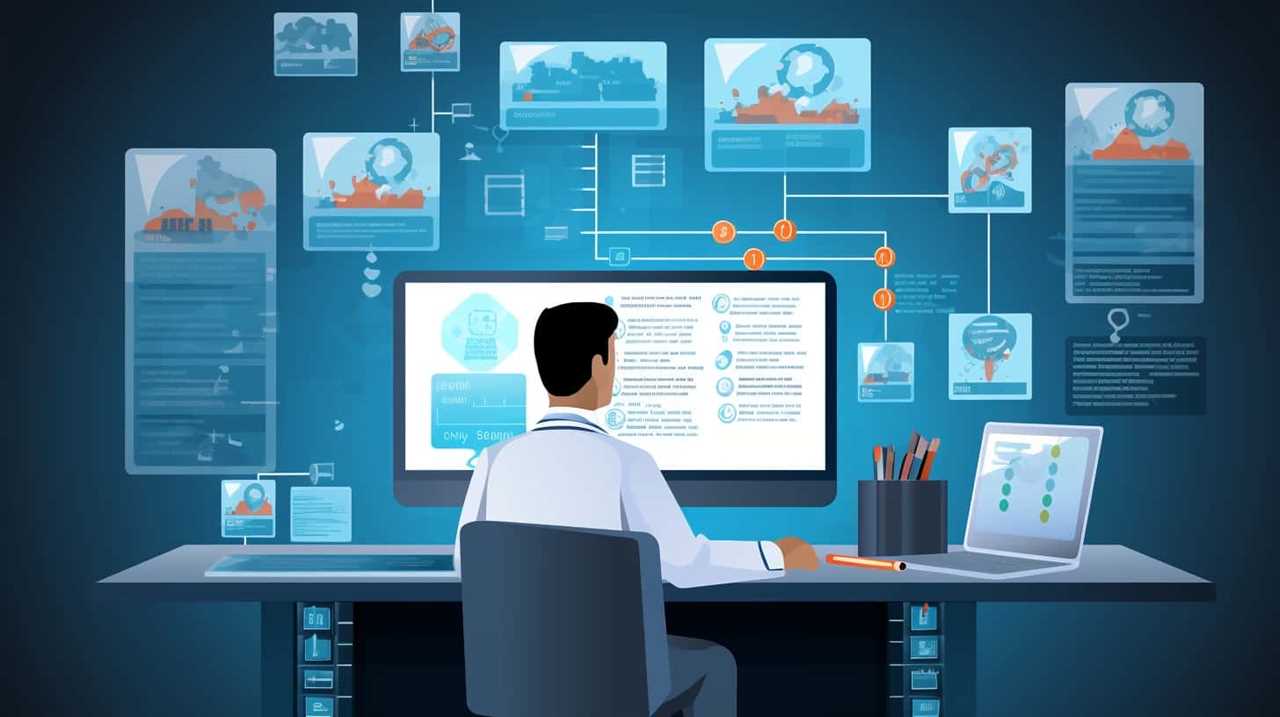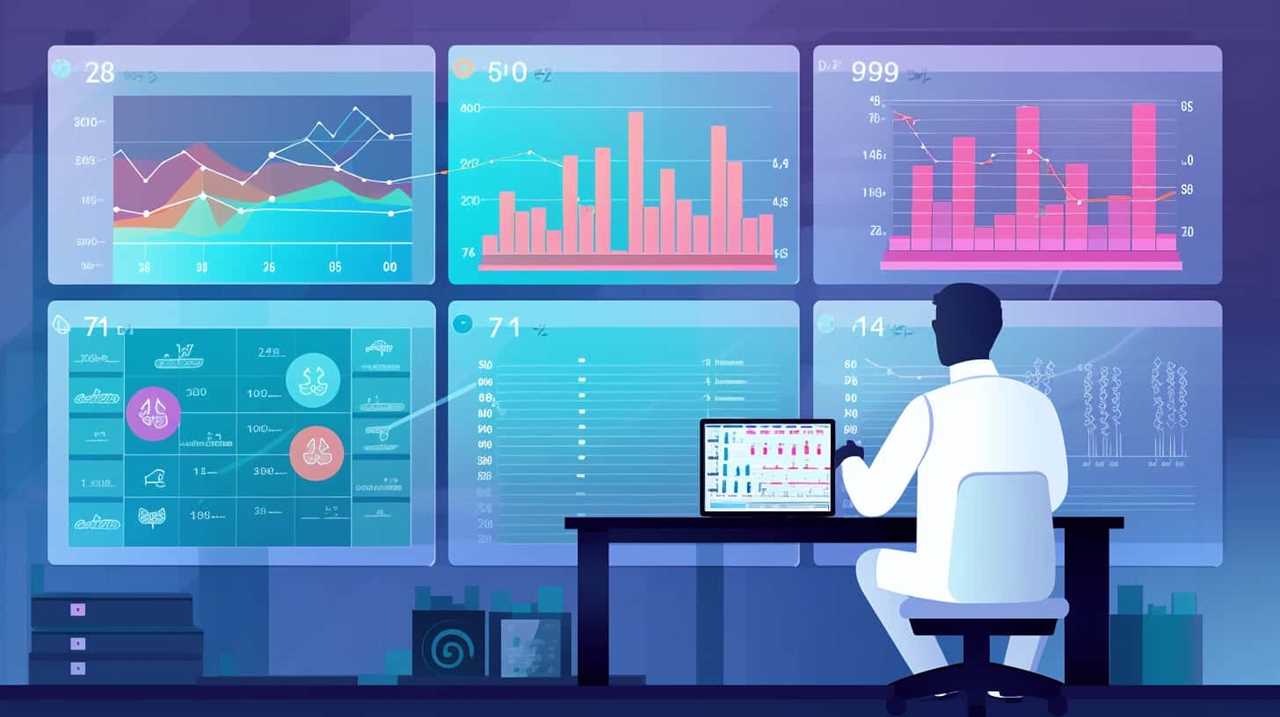At the forefront of medical progress, artificial intelligence (AI) is revolutionizing the healthcare industry. Through the analysis of vast datasets, AI greatly enhances efficiency in diagnosing and treating patients, streamlines administrative tasks, enhances patient monitoring and care, and propels medical research and innovation.
By harnessing the power of AI, we can increase accuracy and efficiency in healthcare processes. Join us as we explore how AI can transform the way we deliver healthcare, maximizing efficiency and improving patient outcomes.
Key Takeaways
- Implementation of remote telemedicine for remote diagnosis and treatment
- AI analysis of vast amounts of data for personalized treatment approaches
- AI automation of scheduling for appointment coordination
- AI-powered predictive analytics for early intervention
Diagnosing and Treating Patients
How can AI improve our ability to diagnose and treat patients more efficiently?
One way is through the implementation of remote telemedicine, which allows healthcare providers to remotely diagnose and treat patients without the need for in-person visits. This technology utilizes AI algorithms to analyze patient data and provide accurate diagnoses.

With the help of AI, healthcare professionals can access patient information, such as medical history and test results, in real-time, enabling them to make informed decisions quickly and efficiently.
Additionally, AI can assist in developing personalized treatment approaches by analyzing vast amounts of data to identify patterns and trends. This allows for tailored treatment plans that are specific to each patient’s unique needs.
Streamlining Administrative Tasks
To further enhance healthcare efficiency, we can leverage AI to streamline administrative tasks.
By automating scheduling, AI can help eliminate the manual process of coordinating appointments and managing calendars. This not only saves time but also reduces the risk of errors and double bookings.

Additionally, AI can play a crucial role in reducing paperwork by digitizing and automating administrative processes such as patient registration and medical record management. This eliminates the need for physical paperwork, making information more easily accessible and reducing the chances of misplacement or loss.
With AI taking over these administrative tasks, healthcare professionals can focus more on patient care and treatment, leading to improved efficiency and better healthcare outcomes.
Enhancing Patient Monitoring and Care
We can significantly improve healthcare efficiency by utilizing AI to enhance patient monitoring and care.
Remote patient monitoring, enabled by AI technology, allows healthcare providers to monitor patients’ vital signs and health conditions without the need for frequent in-person visits. This not only reduces the burden on healthcare facilities but also provides patients with the convenience of receiving care from the comfort of their homes.

Additionally, AI-powered predictive analytics can help identify patterns and trends in patient data, enabling healthcare professionals to intervene early and prevent potential complications.
By leveraging AI in patient monitoring and care, healthcare providers can ensure proactive and personalized treatment, leading to better outcomes and reduced healthcare costs.
Now, let’s explore how AI can further contribute to improving medical research and development.
Improving Medical Research and Development
In our efforts to maximize healthcare efficiency with AI, one area that holds immense potential for improvement is medical research and development. With the power of AI, we can revolutionize the way data analysis is conducted in clinical trials, leading to faster and more accurate results.

Here are three ways AI can transform medical research and development:
- AI algorithms can analyze vast amounts of data, extracting valuable insights and patterns that may have otherwise been overlooked by human researchers.
- AI can aid in patient selection for clinical trials, identifying individuals who are most likely to benefit from the treatment being tested.
- AI can streamline the process of drug discovery by rapidly screening and analyzing large databases of compounds, expediting the identification of potential candidates.
By leveraging AI in medical research and development, we have the opportunity to accelerate the pace of innovation and bring new treatments to patients more quickly and efficiently.
This seamless integration of AI can then seamlessly transition into the subsequent section about increasing accuracy and efficiency in healthcare processes.
Increasing Accuracy and Efficiency in Healthcare Processes
Our team is continuously working towards enhancing accuracy and efficiency in healthcare processes by harnessing the power of AI.

One way we achieve this is by automating scheduling through AI algorithms. By analyzing patient data, appointment availability, and medical staff schedules, AI can intelligently recommend optimal time slots for appointments, reducing wait times and maximizing resource utilization.
Additionally, AI plays a crucial role in optimizing resource allocation. Through data analysis and predictive modeling, AI can identify potential bottlenecks, anticipate patient demand, and allocate resources such as hospital beds, equipment, and staff accordingly. This not only improves patient care but also reduces costs and enhances overall operational efficiency.
Frequently Asked Questions
How Can AI Technology Be Used to Improve Patient Engagement and Communication in Healthcare Settings?
AI technology can improve patient engagement and communication in healthcare settings by providing personalized care and remote monitoring. Increased patient satisfaction leads to better outcomes. With AI, we can maximize healthcare efficiency.
What Are Some Potential Ethical Concerns and Challenges Associated With the Implementation of AI in Healthcare?
Ethical concerns and challenges associated with AI in healthcare include privacy breaches, biased algorithms, and loss of human touch. These issues must be addressed to ensure patient trust and the responsible use of AI technology.

Can AI Algorithms Be TrAIned to Predict Patient Outcomes and Identify Individuals at High Risk for CertAIn Medical Conditions?
AI algorithms can be trained to predict patient outcomes and identify individuals at high risk for certain medical conditions. This application of predictive analytics and risk stratification has the potential to greatly improve healthcare efficiency.
How Can AI Systems Help in the Early Detection and Prevention of Infectious Diseases?
AI systems can revolutionize early warning and outbreak management. By analyzing vast amounts of data, we can identify patterns and trends, enabling quick detection and prevention of infectious diseases. It’s a game-changer for healthcare.
Are There Any Limitations or Potential Risks in Relying Heavily on AI for Decision-Making in Healthcare?
There are limitations and potential risks in relying heavily on AI for decision-making in healthcare. It is important to consider issues such as data bias, lack of human judgment, and the potential for errors or misinterpretations.
Conclusion
In conclusion, AI has revolutionized healthcare by maximizing efficiency in diagnosing and treating patients, streamlining administrative tasks, enhancing patient monitoring and care, improving medical research and development, and increasing accuracy and efficiency in healthcare processes.

With AI’s incredible capabilities, healthcare professionals can now achieve unprecedented levels of productivity and precision, paving the way for a future where healthcare is faster, more accurate, and more accessible than ever before.
The potential of AI in healthcare is truly mind-blowing, and its impact will continue to shape the industry for years to come.








